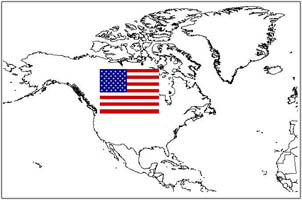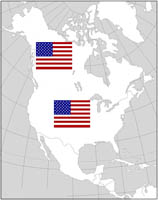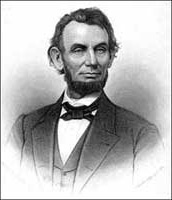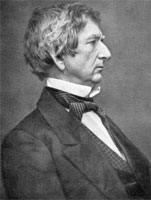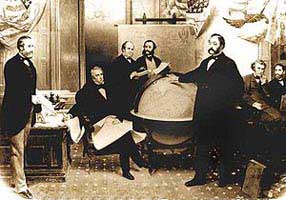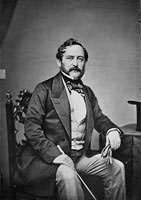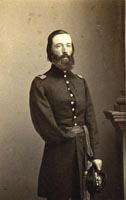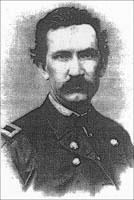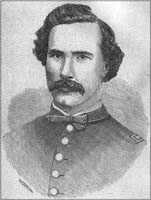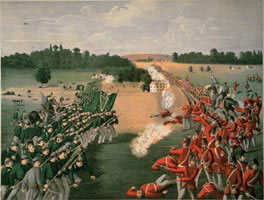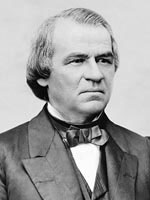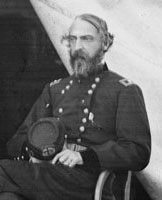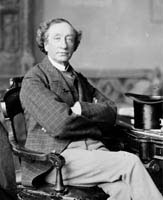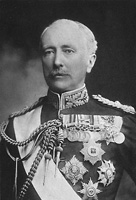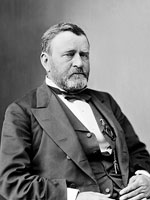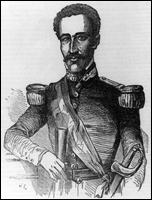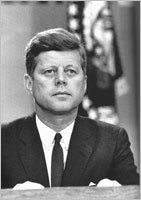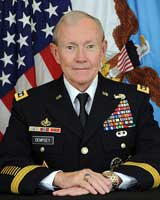IT'S NOW TIME FOR CANADAEXIT.... AS LONG AS THE BRITISH EMPIRE MAINTAINS A SPYING STATION IN CANADA, AMERICA WILL NEVER BE GREAT AGAIN!! |
Canada is the only country in the New World that is still a monarchy. Monarchies belong to the Old World. There have been great kings in Britannia, like Alfred the Great, Henry VIII, and George III. However, the Achilles heel of monarchies is hereditary succession....Good kings cannot guarantee that their sons will follow in their footsteps. King David was Israel's greatest king, but Solomon his son turned away from following JEHOVAH.
As long as Canada is a part of the British Empire, the Canadians will not be allowed to have friendly relations with their giant next door neighbor, namely the great Russian nation.
President Lincoln was about to enforce the Monroe Doctrine and the flag of freedom was about to fly over all of the North American continent....That was the main reason for his assassination....Ending slavery was not such a radical idea because slavery was officially outlawed in 19 states prior to the Civil War.
|
Had he lived, President Lincoln would have annexed British North America to the Union, and French would have been the 2nd language of the U.S. because Mrs. Lincoln spoke fluent French.
President Lincoln's motto was "one war at a time." The President was waiting for the end of the Civil War to enforce the Monroe doctrine. After the war, the U.S. had over 1 million men under arms and the most powerful navy, with new ironclad ships, and powerful guns designed by Admiral Dahlgren. It was the perfect opportunity to enforce the Monroe Doctrine and get the Union's arch-enemy out of the New World for good:
The occasion has been judged proper for asserting, as a principle in which the rights and interests of the United States are involved, that the American continents, by the free and independent condition which they have assumed and maintain, are henceforth not to be considered as subjects for future colonization by any European powers. (1823, Monroe Doctrine).
President Lincoln knew that ending slavery was only half the job of saving the Union. The other half was ending the northern threat:
In late March 1865, President Lincoln had discussed the Trent affair with General Grant, making it clear that Britain deserved to be punished: "We gave due consideration to the case, but at that critical period of the war it was soon decided to deliver up the prisoners. It was a pretty bitter pill to swallow, but I contented myself with believing that England's triumph in the matter would be short-lived, and that after ending our war successfully we would be so powerful that we could call her to account for all the embassassments she had inflicted upon us." (Forman, A World on Fire: Britain's Crucial Role in the American Civil War, p. 801).
The Papal monarchy was also in violation of the Monroe Doctrine because the Vatican is just a political system disguised as a religion.
|
A few days before the assassination, Seward had a "carriage accident" that forced President Lincoln's return to Washington City before the surrender of Lee. Seward wore a brace from a fractured jaw, and that brace saved his life from a vicious knife attack.
Seward and Russian ambassador Eduard de Stoeckl knew that the British were the instigators and financiers of the Civil War. They both agreed that for the future peace and prosperity of the New World, Britain must be expelled from the continent for good.
|
The treaty was signed by Robert S. Chew, William H. Seward, William Hunter, Mr. Bodisco, Eduard de Stoeckl, Charles Sumner and Frederick W. Seward.
The assassination stilled the powerful voice of the President and the man that replaced him—Andrew Johnson—was just a tool of the British government.
When Secretary of State Seward was negotiating with Russia for the purchase of Alaska, the U.S. government expected that the British government would give British Columbia to the U.S. as compensation for all the destruction wrought by the Alabama:
Most newspapers in April 1867 supported the proposed purchase of Russian America. The New York Herald praised the agreement, especially because it increased the likelihood that the United States would acquire British Columbia. The Daily Alta California declared that it is of the highest importance to the whole country, and to the interests of this Coast particularly, that the territory should be consolidated as soon as possible. The Stars and Stripes should fly without rival from Behring's Straits to Cape St. Lucas," that is, to the southern tip of Baja California. The Chicago Tribune, although it almost always opposed Johnson and Seward, nevertheless favored the treaty. Many papers emphasized the treaty would strengthen the relationship between the United States and Russia. The National Republican declared that "if this country had a national friend it has been Russia," and commended the way in which the treaty would bring the two nations into friendly contact in the North Pacific, calling it "the greatest diplomatic achievement of the age. (Stahr, Seward: Lincoln's Indispensable Man. p. 488).
Remarkably, just as the war ended and the U.S. was in a position to enforce the Monroe Doctrine, an invasion of Canada from the U.S. occurred, led by a group of Irishmen called Fenians.
The Fenian false flag operation!!
The Fenians were an Irish secret society which infiltrated the U.S. prior to the Civil War. Their ostensible purpose was to drive the British out of IRELAND, but in reality, most of them were British spies!!
After the Glorious Revolution of 1688, Papal sovereigns were banned from the British throne. The British government circumvented this prohibition by using the Irish as their surrogates. It was just another diabolical Jesuit plot.
|
Civil War generals Sweeny and Murphy, with colonel O'Neill, led the invasion force into Canada.
At the Battle of Ridgeway, inexperienced Canadian soldiers faced Irish veterans of the Civil War. It turned into a rout, and the British realized that they needed more troops from Britain against the Fenian threat.
|
This plot was almost as diabolical as the assassination of President Lincoln. President Johnson sent general Meade to arrest the Fenians and stop the invasion.
|
Johnson was a friend of Booth, and Booth left his calling card at Johnson's residence, the Kirkwood House, the day of the assassination. Meade was an outright traitor and he let the entire rebel army escape after the great victory at Gettysburg.
There was another Fenian false flag operation in January 1867, and this time the British sent their most experienced soldier, colonel Garnet Wolseley, to defeat the "invasion." The Fenian folly was the greatest boon to Canadian federation under the British Empire:
Historically, the Fenians were probably a blessing to Canada. They united the country as nothing else could. A comic-opera attempt to invade Campobello Island helped persuade New Brunswick voters that they needed the new Canadian Confederation. For another couple of generations, Fenians became the handiest bogey for any Canadian politician faced with unrest or disaffection. For the militia, the raids provided an incentive for training and a stiff but relatively cheap lesson in the value of discipline. When Fenians returned in 1870, Canadian militia along the Quebec border had no difficulty in driving them from Eccles Hill and Trout River. The Fenians also provided an unanswerable argument for the British military presence. Since Canada was only an innocent proxy for Irish hatred of England, the British had an obligation to defend her borders. Indeed they did. By the summer of 1866, the British had raised their Canadian garrison to 11,741 men and held 4,969 troops in the Nova Scotia command. The Royal Navy reopened Kingston as a base and maintained fifteen gunboats on the lakes. British officers trained the militia and organized a memorable camp at Laprairie for over a thousand volunteer officers. (Morton, A Military History of Canada, p. 89) .
In July 1867, the British North America Act became effective, which created a national government for four eastern provinces, including Quebec and Ontario.
By 1870, British hegemony over Canada was complete!!
By 1870, it was too late to enforce the Monroe Doctrine. The U.S. army had demobilized, and the number of ships in the navy were drastically reduced.
|
Colonel Garnet Wolseley was the personification of British imperialism. During the Civil War, he sneaked into Richmond, and had a long discussion with Jefferson Davis and the other rebels. He was infuriated when President Lincoln's deft diplomacy prevented him from going to war with the United States:
Wolseley was soon given the opportunity to put into practice many of the principles he had expounded in The Soldier's Pocket Book, when he was appointed to command the Red River expedition to crush a rebellion in western Canada. In 1867 the Canadian government had begun a scheme for the federation of the provinces of Canada. The Red River valley, in the heartland of Manitoba, became the centre of controversy. The land was held by the Hudson's Bay Company, who had a monopoly of trade with the Indian tribes. The company's resistance to the incorporation of its territory into the Canadian government was overcome with a payment of £300,000, but the settlers in the region were less amenable to change. The British settlers were prepared to await the publication of the Manitoba Bill, but the métis, or French-Canadians, were not, and rose in revolt in November 1869. They set up a provisional government at the largest settlement in the area, Fort Garry, under their leader Louis Riel. Admittance was refused to Canadian surveyors, and to the newly appointed Lieutenant Governor, William McDougall, whom Wolseley described as "a cold-blooded man, destitute of geniality and of sympathy in dealing with men." This unfortunate appointment worsened the situation. Riel court-martialled and shot a loyal British settler called Thomas Scott, adding the crime of murder to that of rebellion. (Kochanski, Sir Garnet Wolseley, p. 44).
This was the same Wolseley who was sent to rescue general Gordon at Khartoum, but he arrived to late to save the general.
|
Grant's Presidency was one of the most corrupt in U.S. history. All of the Presidents that followed Lincoln were mediocrities because none of them dared enforce the Monroe Doctrine.
General Grant saw—but overlooked—evidence of British involvement on every battlefield of the Civil War, with their Enfield rifles, and ammunition manufactured in Britain.
Grant never made an attempt to enforce the Monroe Doctrine, but he did try to annex the Dominican Republic instead. Grant dealt with a dictator named Buenaventura Báez, who was very anxious to annex his country to the U.S. in order to flood the country with voodoo and drugs.
British hegemony over Canada is a DISASTER for the entire world!!
The assassination of President Lincoln was an unmitigated DISASTER for the entire world. Had he lived, President Lincoln would have enforced the Monroe Doctrine.
This Scripture from the Prophet Isaiah would have been literally fulfilled:
And he shall judge among the nations, and shall rebuke many people: and they shall beat their swords into plowshares, and their spears into pruninghooks: nation shall not lift up sword against nation, neither shall they learn war any more. (Isaiah 2:4).
With the U.S. policing the New World . . . and the great Russian nation policing the Old . . . the nations would have been forced to beat their swords into plowshares and their spears into pruning hooks. The Republican form of government would have prevailed all over the world and monarchies would have been relegated to the bust bin of history . . . where they rightly belong.
There never would have been a Spanish-American War, a First World War, a Second World War, a Cold War, a Korean War, a Vietnam War, etc., etc. The number of men, women, and children killed in wars since 1865 is probably approaching 1 BILLION . . . and there is no end in sight!
Because of the unguarded 3,000 mile border between the U.S. and Canada, British spies are more ubiquitous than the plague of frogs on ancient Egypt:
And Aaron stretched out his hand over the waters of Egypt; and the frogs came up, and covered the land of Egypt. (Exodus 8:6).
The Kennedys were very prominent Fenians or British spies who played a decisive role in the nation's history.
|
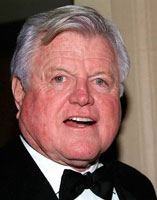 Sir Edward Kennedy (1932 – 2009). |
The Pentagon—the standing British army headquarters in Washington City—is also filled with Fenians.
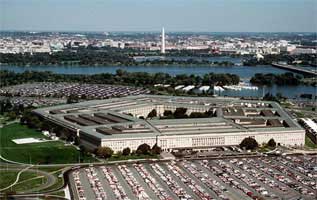 The British army headquarters in the U.S. |
|
The U.S. State Department is also filled with Fenians . . . not to mention the U.S. Congres . . . and all other departments of the U.S. government.
The Exodus is a marvelous type of Armageddon and the end of the world. When the Egyptians were pursuing the children of Israel at the Red Sea, JEHOVAH sent his MECHANIC-ANGELS to pull off the wheels of their chariots—in order to slow them down:
And it came to pass, that in the morning watch that JEHOVAH looked unto the host of the Egyptians through the pillar of fire and of the cloud, and troubled the host of the Egyptians, and took off their chariot wheels, that they drove them heavily: so that the Egyptians said, let us flee from the face of Israel; for JEHOVAH fighteth for them against the Egyptians (Exodus:14:24-25).
In these last days . . . we cannot stop . . . but only slow down . . . Pharaoh's last mad suicidal charge . . . so all true Christians should become MECHANICS for CHRIST!!
References
Foreman, Amanda. A World on Fire: Britain's Crucial Role in the American Civil War. Random House, New York, 2010.
Morgan, Jack, Through American & Irish Wars: The Life & Times of General Thomas W. Sweeny. Irish Academic Press, Dublin, Ireland, 2006.
MacDonald, John A. Troublous Times in Canada-A History of the Fenian Raids of 1866 and 1870. W.S. Johnson & Co., Toronto, 1910.
Morton, Desmond. A Military History of Canada. Hurtig Publishers, Edmonton, Canada, 1985.
Stahr, Walter. Seward: Lincoln's Indispensable Man. Simon & Schuster, New York, 2012.
Halik Kochanski, Sir Garnet Wolsey: Victorian Hero. The Hambledon Press, London, 1999.
Copyright © 2019 by Patrick Scrivener
